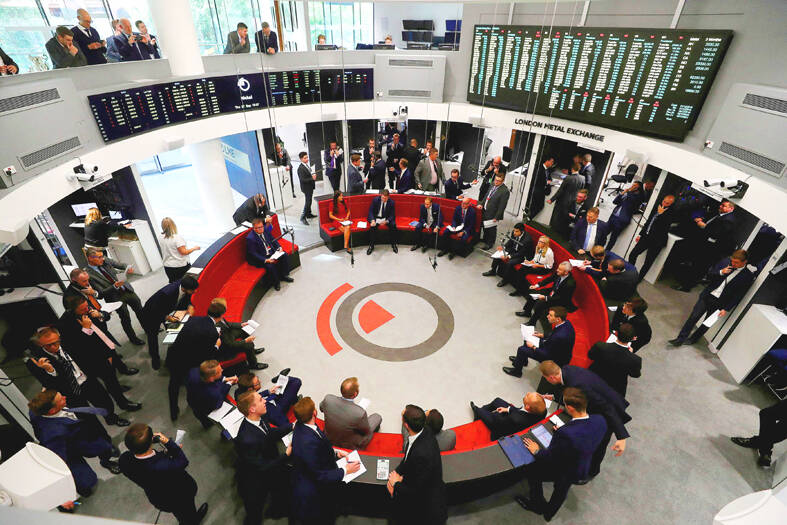The London Metal Exchange (LME) on Saturday banned from its system Russian metal produced on or after April 13 to comply with new US and UK sanctions imposed for Russia’s invasion of Ukraine.
The sanctions aim to restrict revenues for Russia from the export of metal produced by companies such as Rusal and Nornickel that help to fund its military operations in Ukraine.
The US Department of the Treasury and the British government on Friday prohibited the 147-year-old LME and the Chicago Mercantile Exchange from accepting new Russian production of aluminum, copper and nickel.

Photo: Reuters
If an owner of Russian metal can provide evidence that it was produced before Saturday, it can still be put on LME warrant — a title document conferring ownership, the LME said.
“Russian metal warrants issued on or after 13 April 2024 for metal produced before 13 April 2024 are still subject to restrictions that prevent UK LME members and clients from canceling or withdrawing the corresponding metal unless they are doing so for the account of a non-UK client,” the exchange said in a statement.
On Friday, a UK official said that London expected any market disruption to be short-lived and that the government had consulted with colleagues in the US, the LME, the Bank of England and the British Financial Conduct Authority to minimize any impact.
One industry source, speaking on condition of anonymity, predicted that price reaction would be muted when trading resumes in Asian time today, while another said that a repeat of the kind of aluminum price jump spurred by US sanctions on Rusal in April 2018 was possible.
Both said that any EU sanctions would be almost certain to trigger a price surge. The bloc last year imported about 500,000 tonnes of aluminum for use in transportation, construction and packaging.
The action does not block bilateral contracts between two companies, rather than via the LME, British officials said on Friday, speaking on condition of anonymity.
The officials said continued trading of Russian metals on the exchanges is expected to be at a discount and that it does not restrict supply.
The share of available aluminum stocks of Russian origin in warehouses approved by the LME was 91 percent last month, while the proportion of copper stocks rose to 62 percent from 52 percent in February. Russian nickel in LME warehouses amounted to 36 percent of the total.
The high share of Russian-origin metal in LME inventories has been a concern for some producers, who compete with Russia’s Rusal, and some Western consumers who have avoided Russian metal since Moscow’s invasion of Ukraine in 2022.
The UK banned the import of base metals from Russia in December last year and said it would extend the prohibition to ancillary services when it could be done in concert with international partners.
The LME, the world’s largest and oldest forum for trading metals, is owned by Hong Kong Exchanges and Clearing Ltd.

Semiconductor shares in China surged yesterday after Reuters reported the US had ordered chipmaking giant Taiwan Semiconductor Manufacturing Co (TSMC, 台積電) to halt shipments of advanced chips to Chinese customers, which investors believe could accelerate Beijing’s self-reliance efforts. TSMC yesterday started to suspend shipments of certain sophisticated chips to some Chinese clients after receiving a letter from the US Department of Commerce imposing export restrictions on those products, Reuters reported on Sunday, citing an unnamed source. The US imposed export restrictions on TSMC’s 7-nanometer or more advanced designs, Reuters reported. Investors figured that would encourage authorities to support China’s industry and bought shares

FLEXIBLE: Taiwan can develop its own ground station equipment, and has highly competitive manufacturers and suppliers with diversified production, the MOEA said The Ministry of Economic Affairs (MOEA) yesterday disputed reports that suppliers to US-based Space Exploration Technologies Corp (SpaceX) had been asked to move production out of Taiwan. Reuters had reported on Tuesday last week that Elon Musk-owned SpaceX had asked their manufacturers to produce outside of Taiwan given geopolitical risks and that at least one Taiwanese supplier had been pushed to relocate production to Vietnam. SpaceX’s requests place a renewed focus on the contentious relationship Musk has had with Taiwan, especially after he said last year that Taiwan is an “integral part” of China, sparking sharp criticism from Taiwanese authorities. The ministry said

US President Joe Biden’s administration is racing to complete CHIPS and Science Act agreements with companies such as Intel Corp and Samsung Electronics Co, aiming to shore up one of its signature initiatives before US president-elect Donald Trump enters the White House. The US Department of Commerce has allocated more than 90 percent of the US$39 billion in grants under the act, a landmark law enacted in 2022 designed to rebuild the domestic chip industry. However, the agency has only announced one binding agreement so far. The next two months would prove critical for more than 20 companies still in the process

CHANGING JAPAN: Nvidia-powered AI services over cellular networks ‘will result in an artificial intelligence grid that runs across Japan,’ Nvidia’s Jensen Huang said Softbank Group Corp would be the first to build a supercomputer with chips using Nvidia Corp’s new Blackwell design, a demonstration of the Japanese company’s ambitions to catch up on artificial intelligence (AI). The group’s telecom unit, Softbank Corp, plans to build Japan’s most powerful AI supercomputer to support local services, it said. That computer would be based on Nvidia’s DGX B200 product, which combines computer processors with so-called AI accelerator chips. A follow-up effort will feature Grace Blackwell, a more advanced version, the company said. The announcement indicates that Softbank Group, which until early 2019 owned 4.9 percent of Nvidia, has secured a